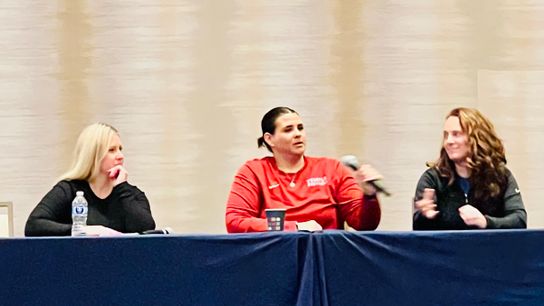FRISCO, Texas – The agenda for the annual National Football Operations Organization Spring Meetings officially listed the Friday morning panel inside the posh Omni’s Star Ballroom as the “Female Football Operations and Support Staff Panel.”
It’s become a staple at the annual meetings that gather the most fundamentally interwoven people of every college football program.
And Boise State’s Charlotte Siegel, Bowling Green’s Damaris Linker and Temple’s Tory Teykl all engaged the capacity crowd about their respective climbs through the college football ranks, their challenges and where, perhaps, the next step for female advancement rests within the college football hive.
All things considered, the trio of off-the-field college leaders would rather just talk about the hurdles for everyone in the industry and what obstacles may be yet to come in the shape-shifting world of NCAA athletics, with conference realignment, mega-money broadcasting rights deals and the burgeoning Name, Image and Likeness era chief amongst them.
“It doesn’t have to do with being female; everyone is in the organization for a reason,” said Siegel, a former collegiate soccer player who also served at Vanderbilt before joining the Broncos, “and everyone has a voice. There’s very much a hierarchy, but I think it’s learned over time, the more people with a voice, the more people who are listened to, the better the program gets.”
Added Teykl, “I was a coach’s kid, my dad was a college coach and then a high school football coach. I didn’t know this job existed till I got older, but I got into it because of what I think the game stands for, and doing what I do, I feel like I’m helping teach them a life skill, I think the game of football teaches that, sports in general.
“When I first got in this (profession) from marketing, they had turned an admin role into an assistant operations position. I wanted to make sure it was operations. I think there’s an importance to the level of professionalism, no matter what it is. Knowing where you want to go and having an awareness, being intentional and know where you might’ve failed. Being able to say, ‘I’d go back and do this differently.’ It’s coming into your own and using you voice and knowing you have a seat at the table.”
As she prepares for her third season atop football operations for Scot Loeffler’s Bowling Green Falcons, Linker is building upon her operations experiences that originate in multiple Power 5 volleyball programs, notably the University of Mississippi and Texas Tech University.
“It got to a point where I was ready for the next step in my career, I had always loved football, been a fan growing up,” said Linker, a former captain on the Quincy University volleyball team. “I wanted to try to get into football, and I think with my work experience in operations and being at some bigger schools, I think that’s why I got into football.”
Troy Wingerter, the Louisiana Cajuns’ associate athletics director and football chief of staff, paused during the panel to note the dramatic changes in the room’s demographics.
“The make-up of this room has changed tremendously, both in gender and minority,” Wingerter said, citing dramatic progress the past decade and noting approximately 16 female DFOs and assistant DFOs in the room. “Don’t miss an opportunity to reach out to someone in this room, because there isn’t a single person in this room who will say “Nah, I ain’t helping you.’ That’s why we have this organization. We share shit in this room.”
And there’s a shared vision for helping all succeed in their current posts and have chances to grow in their careers.
“As we’re starting to see more female DFOs, assistant DFOs,” said Marshall’s Sharrod Everett, the Herd’s assistant A.D. and chief of staff for football. “How do we take the next step for females to be chiefs of staff, assistant athletics directors?”
With agreement from her peers on the panel, Teykl offered her trademark candor.
“Are you giving people an opportunity to learn a skill-set?,” she asked. “’I’m very intentional with my graduate assistants. I want to throw them into the fire and let them learn to problem solve, give them room to grow and fail.”
